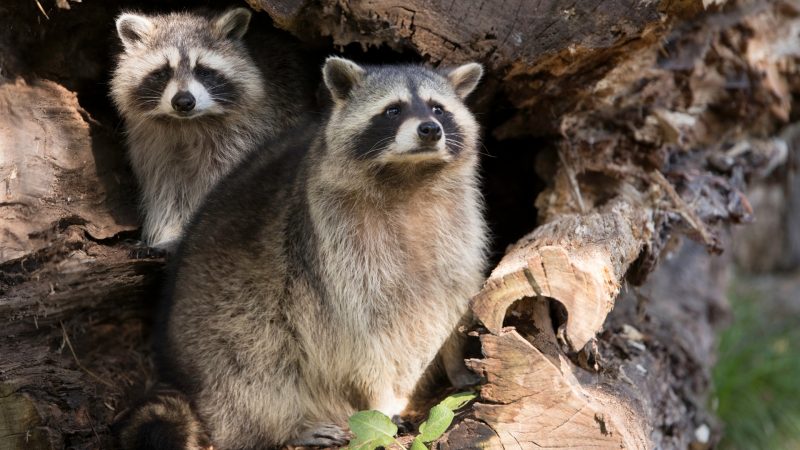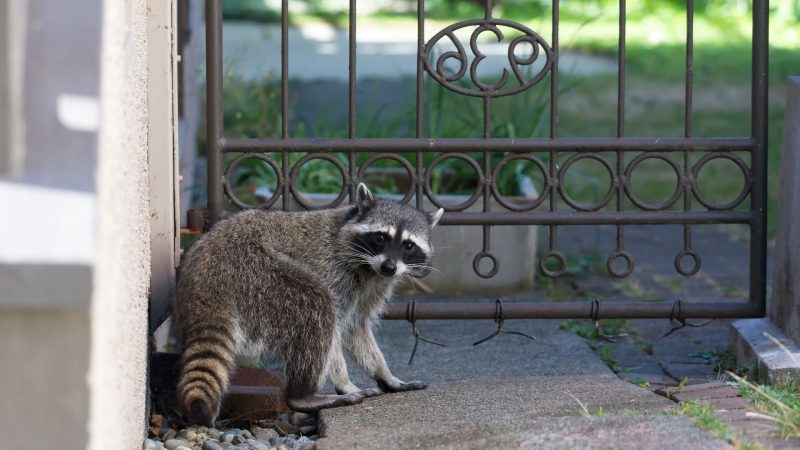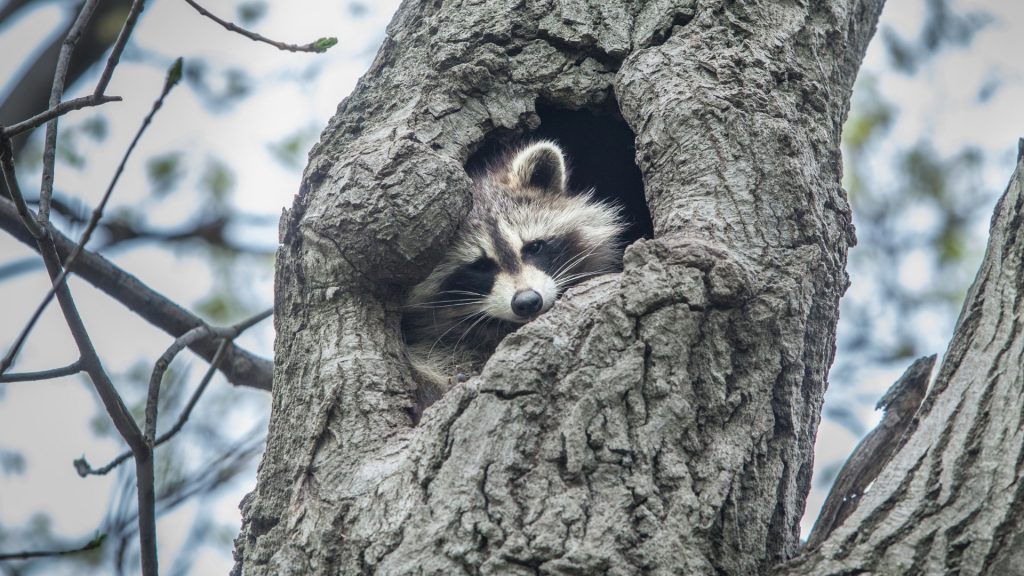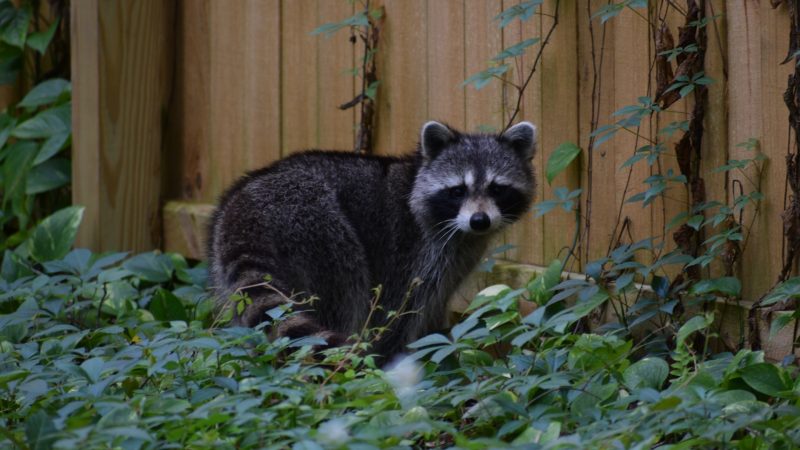Raccoons are known to be nocturnal, which means they sleep during the day and are most active at night. However, you may also see them walking around in the daytime. But don’t be worried; they may simply be looking for food or a new place to live since competition is already fierce in their present nest.
But where do raccoons nest? Raccoons nest almost anywhere they are safe from predators. Therefore, they need trees and bushes as covers. Nevertheless, these small, bear-like animals prefer staying in dumps, caves, and mature woodlands. Sometimes, they also nest inside homes and buildings.
Scientifically known as Procyon lotor, raccoons are solitary animals, but they can live close to humans. They are also excellent climbers and can easily adapt to changes in the environment.
Raccoons are rabies carriers and are considered pests. This is why you should know how to find their nest and get rid of them. Read on to learn more about them.
What Does a Raccoon Nest Looks Like?

A raccoon nest looks like a simpler version of a squirrel nest. But instead of a collection of twigs and leaves, raccoons use hay and long grasses. These materials are ideal to provide warmth and comfort. If raccoons are in the city, they usually nest in attics and chimneys where females raise their young.
How Do Raccoons Make Their Nests?
Raccoons make their nest by shredding the collected material until it becomes a pile that they can burrow within. Interestingly, raccoons are lazy creatures, and most of the time, they don’t create their nest. Instead, these masked bandits rely on dens where other animals used to stay or what nature allows them to use.
How Can You Find a Raccoon Nest?

Just like opossums, raccoons prefer staying in underground burrows dug by other animals or even a fox den. But as mentioned earlier, these masked bandits may also use your chimney or attic as a nest or den. Once they have built their nest inside our house, you can already detect some signs of their presence.
1. Look for Raccoon Poop and Urine
To find a raccoon nest, look for their communal site latrine. Raccoon droppings are usually cylindrical and have round or broken ends. They are mostly black, but the color may depend on what the animal ate. On the other hand, raccoon urine has a very strong odor and may leave stains on your ceiling.
However, raccoons can spread infectious diseases through their droppings and urine. This includes Leptospirosis, Salmonella, and Giardiasis. Raccoon poop also contains roundworm eggs (Baylisascaris procyonis). This can make you very sick once you accidentally swallow them or have direct contact with them.
Related: Raccoon Feces (Toxicity, Dangers, and Diseases) | Control and Prevention
2. Look Where Raccoon Sounds Are Coming From
Aside from having excellent eyesight in the dark, raccoons are also extremely noisy creatures. Therefore, you may hear them growling, snarling, hissing, whimpering, and whistling, especially at night. They also usually make scratching noises around your attic and walls, especially when they are making a nest or den.
On the other hand, baby raccoons (called kits) usually whine, chirp, or cry if their mother is away. Adult raccoons also make scary and violent sounds while they are fighting. Interestingly, they also make similar sounds while mating. So if you hear any of these raccoon sounds, go and find where they are coming from.
3. Look Outside Your House
Raccoons are also omnivores, which means they eat both plants and animals. But in general, they eat almost anything available. So if you see them outside your house, chances are you can also find their nest nearby. If you have poultry and some of your chickens become headless, raccoons may also be the culprit.
During the daytime, you may also find raccoons resting on their nest, especially in the hollows of high trees, rotten logs, and beneath fallen trees. Nevertheless, these furry critters also like dens near the water, where they can forage for fish, clams, and frogs. But again, they prefer a higher place to avoid predators.
What Time of Year Is Raccoon Nesting Season?

Raccoons usually mate between January and June. Male raccoons mate with several females and will leave them. Raccoon pregnancy lasts from 60 to 73 days, and female raccoons may give birth to a litter of 2-5 kits between March and April. During this nesting season, you may find some raccoons in your attic or chimney.
Related: What Time of the Year are Raccoon Babies Born? | Information and Facts
Do Raccoons Nest Together?
Raccoons nest together, but not as pairs. This means that male and female raccoons live separately. Mother raccoons take care of their babies alone until they are about 8-9 weeks old. During the adolescence stage, their mother will teach them how to hunt for food and how to climb so they can escape from predators.
Female raccoons are sociable and usually stay in groups which are called gaze. They may even share a common den and will feed their young together, especially in the fall. A gaze usually consists of 5-6 raccoons. During winter, they may also share their den with other species, such as skunks.
When Do Baby Raccoons Leave the Nest?
Young raccoons follow their mother to another den until they are about 1 year old. Some of them may start living independently at 10 months of age. In some cases, an 8-month-old male raccoon will already leave his mother. Nevertheless, young male raccoons tend to become independent earlier than females.
Do Raccoons Return to the Same Nest?
Raccoons return to the same nest but very seldom only. They move from den to den very frequently and sometimes, every night. Nonetheless, these intelligent creatures can easily find their way back home. This amazing ability is most common to mother raccoons that left their young on their nest.
Raccoons leave their nest and will never return once they realize they are no longer safe in that area or if you disturbed their den. Although raccoons sleep long during colder months, they don’t hibernate and may still go out once in a while.
Related: Do Raccoons Hibernate? | Information and Facts
How Can You Get Rid of Raccoon Nest?

To get rid of a raccoon nest, you should evict the raccoons and prevent them from coming back. Once you find their nest and their latrines, avoid getting near to their poop or urine. As mentioned earlier, you are very likely to get infectious diseases from touching them. Here are some tips to drive raccoons away.
1. Know the Laws in Your Area
Raccoons are currently not listed as endangered species, but they are protected by law. In most states, you may be allowed to trap raccoons and kill them humanely. However, you may relocate them, but you have to call the proper authorities. So before taking any action, you should know your state laws.
2. Find Their Point of Entry
Inspect your house thoroughly and look for small holes or openings where raccoons may have used to enter your house. These fur-bearing animals can also fit through your cat door. They can easily climb to your roof and enter your attic through vent covers, roof edges, and a chimney, which is their favorite nest.
3. Trap the Raccoons
If the law allows you to trap raccoons, use bait to attract them. You can use wet cat food, marshmallows, fresh fruit, or a whole egg. Once you catch a raccoon, don’t just leave it anywhere. Instead, relocate it following your state laws. Normally, they should be at least 10 miles away from your house.
Note: Always wear the proper PPE (personal protective equipment) when handling raccoons.
4. Scare the Raccoons Away
If you see a raccoon or hear its sounds, scare them away by creating some loud noises. You can use a loudspeaker, a horn, a loud radio, wind chimes, or firecrackers. Also, you can knock on pans and pots or scream at them. Make sure that doors are open so they can easily escape and no one will be left behind.
5. Make Sure There Are No Baby Raccoons Left
Baby raccoons will starve to death without their mother. So if you were able to evict the mother but not her kits, they will die. Aside from the foul smell, their dead bodies will also attract flies. And most likely, their mother will come back for them. Therefore, make sure there are no kits left in your chimney or attic.
How Can You Prevent Raccoons From Coming Back?
Raccoons are very persistent animals. Therefore, here are some quick tips that can help you prevent them from coming back.
- Don’t feed the raccoons. You should not be deceived by their cuteness and should not treat them as pets. If you have pet cats or dogs, feed them inside your house.
- Use a guard dog. Akbash, Great Pyrenees, and Pyrenean Mastiff are some of the dog breeds that can easily be trained to scare raccoons away.
- Build raccoon-proof fences. Put metal spikes or crumpled aluminum foil on top of your fence. You may also use a low, .
No products found.
- Install motion-sensor devices . These devices usually emit loud sounds or bright light when triggered.
- 【EFFECTIVE】With an improved coverage range up to 5, 500...
- 【ADJUSTABLE SETTING】3 Operating Time: Day/Night /24 HR; 3...
- 【CUSTOMIZABLE】Using either four C batteries or the included...
- 【3 MODES OPERATION 】: Raccoon Repellent Outdoor has Day,...
- 【SUGGEST】 As an annoyance based deterrent, we know the Yard...
- Observe proper sanitation. This includes sealing, emptying, and cleaning your outdoor garbage can before going to sleep.
Related: Natural Raccoon Repellents That Work | Control Guide
List of Sources
Raccoons (Procyon lotor). Washington Department of Fish and Wildlife.
Raymond, J. (1997). Common Infectious Diseases of Raccoons. Purdue University.
Baldwin, R. A. (2014). Raccoons. University of California.
- How to Get Rid of Copperheads | Practical Guide - August 27, 2023
- How to Get Rid of Corn Snakes | What Makes Them Aggressive? - August 27, 2023
- How to Get Rid of Alligators | Safety Measures and Removal Methods - July 16, 2023

